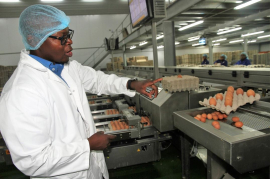
Ofentse Moloko, a 37-year-old entrepreneur from the North West, says the support government gives to Black-owned companies operating in the poultry industry will contribute significantly to transforming the sector and ensuring food security in the country.
Moloko, the CEO and Managing Director of Baramakama Poultry, runs a family-owned egg-laying chicken company in Molote City, North West.
He believes that the sustainability of businesses depends on Black-owned companies occupying the entire value chain of the industry.
Baramakama received support to the tune of R50 million from the Department of Trade, Industry and Competition (the dtic) and its development finance institution, the Industrial Development Corporation (IDC), as part of the Black Industrialists Programme.
“We are the perfect example of the success that Black-owned companies can achieve with the support of government in the poultry industry,” says Moloko.
The Black Industrialists Programme is part of government’s efforts to accelerate the quantitative and qualitative increase and participation of Black Industrialists in the South African economy, selected industrial sectors and value chains.
Moloko recalls how his father, who “started from nothing back in 2016”, used his savings to invest back into the community of Molote City.
“We decided to establish a poultry business, specifically in the layers as they showed the greatest opportunity for employment creation ,as well as massive room for economic and ownership transformation.
“For almost three years, we persistently and continuously knocked on the doors of all the private banks in this country, but the doors were all slammed on us after months of completing their processes, mainly due to the land belonging to the community.
“When the dtic and IDC decided to fund our business after a thorough due diligence process, it was like music to our ears.”
The financial support from the dtic and IDC enabled Baramakama to expand its operations by adding five new automated chicken houses and a modern, state-of-the-art pack station. The family business has also managed to increase the premise’s carrying capacity from 100 000 hens to 280 000.
In addition, the company has now added 40 new jobs, while the number of permanent employees jumped from 80 to 112. Of these, almost 80% of the employees are young people, while 44% are women.
“Today, our operation runs 24 hours per day and on average, we produce 225 000 eggs per day at full capacity. The support we received from government has made us a recognisable and important player in the industry,” Moloko says.
Although he appreciates the importance and recognises the value of the support that government provides to Black Industrialists, Moloko strongly believes that government should consider extending its backing across the value chain of the poultry industry to achieve sustainability and ensure success.
“Government support needs to cut across the value chain if we want meaningful transformation of the industry, and if we want the Black industrialists to play an important and discernible role in food security in the country.”
This includes feed production, hatcheries, abattoirs, chick rearing, processing and market access.
“Although we regard ourselves as a success after obtaining the support, we are left at the mercy of our key competitors from whom we source feed and hens. That makes us vulnerable as the supply tabs can and are regularly switched on and off, depending on how they want to control and benefit from the market conditions,” Moloko says.
He does not pin all his hopes on the Poultry Sector Master Plan -- which was developed in close partnership between government and several stakeholders in the industry -- to increase the level of Black participation, particularly ownership across the value chain, employment creation and worker share-ownership in the sector.
Moloko is of the opinion that the decisions taken within the Poultry Master Plan depend on the existing big players in the industry, who, through their actions, do not easily allow Black players into the more profitable value chain channels.
However, he remains resolute and hopeful that with more Black players in the value chain, the industry will not only transform but also allow healthy competition to the benefit of all participants. – SAnews.gov.za


